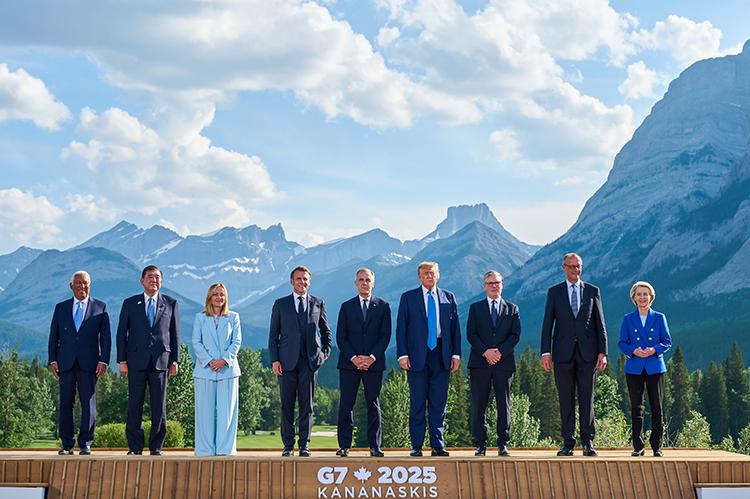President von der Leyen attends G7 Summit focused on Global Economic Security and Geopolitics
President Ursula von der Leyen participated in this year’s G7 Summit in Kananaskis, Canada, where global economic security, geopolitical tensions, and strategic partnerships dominated the agenda. The summit took place amid heightened global instability, including Russia’s ongoing war against Ukraine, growing tensions in the Middle East, and increasing concerns over China’s role in the global economy.
At the opening press conference alongside European Council President António Costa, von der Leyen outlined the EU’s key priorities, including reducing economic dependencies, addressing aggressive trade practices, and responding to global conflicts. She emphasized the interconnected nature of current crises, noting that Iranian-designed drones and missiles are now being used in both Ukraine and Israel, illustrating the link between European and Middle Eastern conflicts.
Von der Leyen also held a bilateral meeting with U.S. President Donald Trump, where both leaders discussed the state of EU-U.S. trade negotiations and instructed their teams to intensify efforts toward a fair agreement.
During summit discussions, von der Leyen led debates on the global economic outlook and called for more stability in trade relations among G7 members. She warned of China’s continued distortion of global markets, criticizing its reliance on subsidies and disregard for intellectual property protections. While she rejected the idea of full decoupling from China, she advocated for a strategy of “de-risking” by reducing dependencies in critical sectors such as rare earths.
She highlighted how China’s strategic investments in mining and manufacturing since the 1980s enabled it to dominate global supply chains, especially in key materials like magnets. Von der Leyen stressed that no single country should control such a high share of essential raw materials.
The summit concluded with G7 leaders adopting a series of joint statements on topics ranging from wildfire management and critical minerals to AI, quantum technologies, and countering migrant smuggling and transnational repression. These principles will guide future cooperation among member states.
On the geopolitical front, the leaders reiterated their support for Ukraine, with von der Leyen noting that the EU has contributed nearly €150 billion in aid. She called for continued pressure on Russia and discussed the EU’s proposed 18th sanctions package. Regarding the Middle East, the G7 issued a statement supporting regional peace, Israel’s security, and efforts to prevent Iran from acquiring nuclear weapons. The leaders also called for de-escalation in Gaza.
Von der Leyen’s bilateral engagements included meetings with Canadian Prime Minister Mark Carney to prepare for the upcoming EU-Canada summit, and with UN Secretary-General António Guterres to reaffirm EU support for the UN’s global role. She also met with South Korea’s President Lee Jae-myung to reaffirm their Security and Defence Partnership, and with Mexican President Claudia Sheinbaum to discuss climate cooperation and progress on a modernised EU-Mexico Global Agreement.
Further talks with Indian Prime Minister Narendra Modi reaffirmed a shared ambition to strengthen EU-India trade ties, while a meeting with Australian Prime Minister Anthony Albanese led to the announcement of negotiations for a new Security and Defence Partnership. The EU and Australia also renewed their commitment to concluding a bilateral trade agreement, underscoring the strength of their longstanding relationship.









